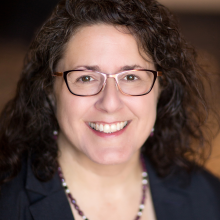Why did you decide to choose developmental science as a course of study or career?
After completing my undergraduate degree, I was working part time in two different jobs, each focused on development. I worked in a day treatment program as an after school and summer program coordinator for children and then adolescents with emotional and behavioral disorders. I also worked part time in Jacque Eccles' research lab on different projects related to adolescent development. In both of those jobs I could feel my lack of education every day, and decided to pursue graduate education focused on families and children. I loved research and working with data, and also loved working directly with youth, in particular facilitating their connections to the community.
Is there a mentor or mentors who have been instrumental to your studies and career path so far, and, if so, who and how?
I have had strong mentorship from a variety of people in my career. As an undergraduate, I first volunteered and then worked in Jacque Eccles' lab, and she mentored my undergraduate thesis. Bonnie Barber was my doctoral mentor, and shaped my thinking about development and family in ways that still influence my work. I began working With Stephen Russell as a postdoctoral researcher, and his mentorship has continued to build my thinking and research focused on LGBTQ+ youth. Professionally, I have had mentorship from many people along the way including Kathleen Rodgers, my faculty mentor at Washington State University, and Jodi Dworkin, my faculty mentor at The University of Minnesota,
What advice would you give to a prospective graduate student thinking about beginning their Ph.D. studies in the developmental science field?
Credibility in research is more important now than ever. With ongoing attacks on science, doing impactful research and sharing it in different ways (journals, societies, the public) helps to build faith in the knowledge base we are jointly creating.
What is your best SRCD memory?
SRCD in Seattle (2013) was where a colleague (Annelou de Vries) and I first presented young adult findings from a long term follow up study of transgender youth who had received gender affirming care with puberty suppression. We had spent the prior year merging developmental and medical thinking to analyze and interpret the findings for a developmental audience. I was nervous to present these findings, and not sure how people would respond. The room was packed and afterwards I felt the significance of the moment in sharing this work. People asked questions, but there was also a strange silence that fell over the room as we all jointly digested this developmental way of thinking about long term medical intervention for transgender kids.
Why did you join the SOGIE Caucus and how does it facilitate connection among members all year long?
I joined the SOGIE caucus when it was first forming because I was excited for the research development and comradery that such an organization can provide. For me, it has created a home in SRCD that provides social and intellectual belonging. There are people in that group I have known for so long now, it feels like a home base, personally and professionally.
